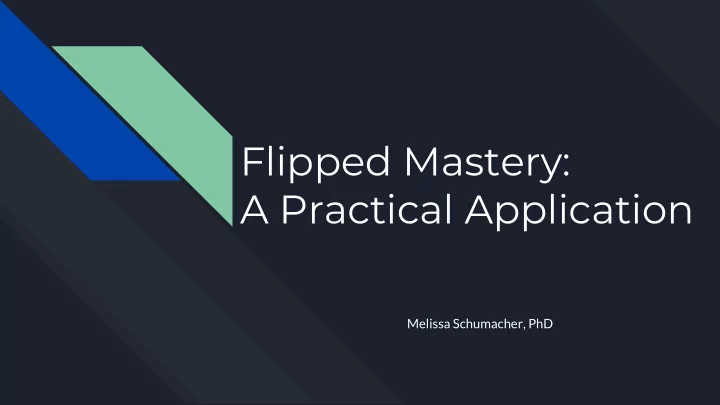

Flipped Mastery: A Practical Application Melissa Schumacher, PhD
Genesis of the project Students ignored/ were stressed out by feedback. Once they fall behind, they’re always behind. I wanted my students to take charge of their education! They felt helpless ● Wouldn’t develop questions about the material for themselves ● Didn’t know how to set their own learning goals ● This is a common problem in my school (And lots of schools)
From flipped to flipped mastery Flipped course: Videos or readings outside of class (largely replaces in-class lectures). ● In class: ● Students do more hands-on, in-depth, rich tasks ○ Teacher is there to help them if needed ○ Flipped mastery course: Students proceed at different paces (Somewhat automatic ● differentiation!) When they have done all the work for a topic, they do a mastery check ● Pass → move on ○ Fail → you help them see what to do next ○ I’m free to work with students one-on-one (leaves time for mastery ● checks)
Leadership opportunity! Flipped mastery is not a new idea, nor that flipping can easily lead to it. But! Implementing it is fairly new, and it can seem intimidating. So I could keep track of how I did it, what happened, and how I solved problems to make it work better for my classroom. Then I can share with colleagues.
What I did: Before 9th/10th grade Geometry course, already flipped At the beginning of each unit, students are given: all assignments ● project description ● unit schedule ● Summative assessments: project and test Formative assessments: quizzes, classwork, answers to questions embedded in videos
What I did: Before What was each day like? List of tasks to be accomplished on the board ● If done early, work on project ○ Often ended up working on tasks for other classes ○ Those who don’t finish have to finish for homework ● No easy way to check whether they had done it! ○ Everyone takes a quiz at the same time, ready or not. Quiz results ● weren’t very helpful.
What I did: After Students still given all tasks at the beginning, but... Unit schedule is broken up by topics ● Proceed at their own pace instead of being assigned tasks each day ● (Keep track of goals with Google Forms) Self-assign homework as needed ● Reflection after each quiz and set of practice problems Students set new goals on the basis of the feedback they received ● New formative assessment: mastery checks Project and unit test are on the same day for everyone
I just want to I’m having a I don’t know what I’m fine! check lot of I should be doing something... trouble right now
What I did: After How do mastery checks work? Once students have finished the work for a topic, they gather: ● Notes on videos ○ Classwork (which they’ve checked with the answer key) ○ Reflections on quizzes and practice problems ○ We look over their work together. ● I read their reflections and ask questions as needed ○ (problem-solving strategies, variations on problems, explain key concepts, etc.) 5-8 minutes ○ If they’re ready to move on, they get a stamp. ● If not, I tell them what they could do next to understand better. ●
What I did: After What is each day like? Students spend more time on tasks as needed ● Mastery checks tell me where everyone is within the unit ● I can spend time with those who need more guidance ● Reflections on quizzes and practice → Less stress for them, no more retakes for me
Problems encountered and solved How to keep track of where everyone is? How to make sure students are reflecting on their work? Students still fall behind Results: Students seem happier during class time. ● Those who work quickly are less frustrated; Those who need more help ● can get it from me, and can spend more time on certain tasks. Easier for me to see what the class’s understanding is; I can adjust test ● questions accordingly. Easier for students to see what they need to work on. ● Quizzes are much less stressful. Students seem more interested in ● figuring out what they did wrong. Less grading time for me.
What did I learn? It’s possible to make significant changes in outcomes with small(ish) changes in class structure. Keep tweaking the class if you have to -- explain why you’re doing it and students will trust you. Don’t think that it’s impossible to do some awesome thing you’ve read about. Go for it!
Questions?
Recommend
More recommend